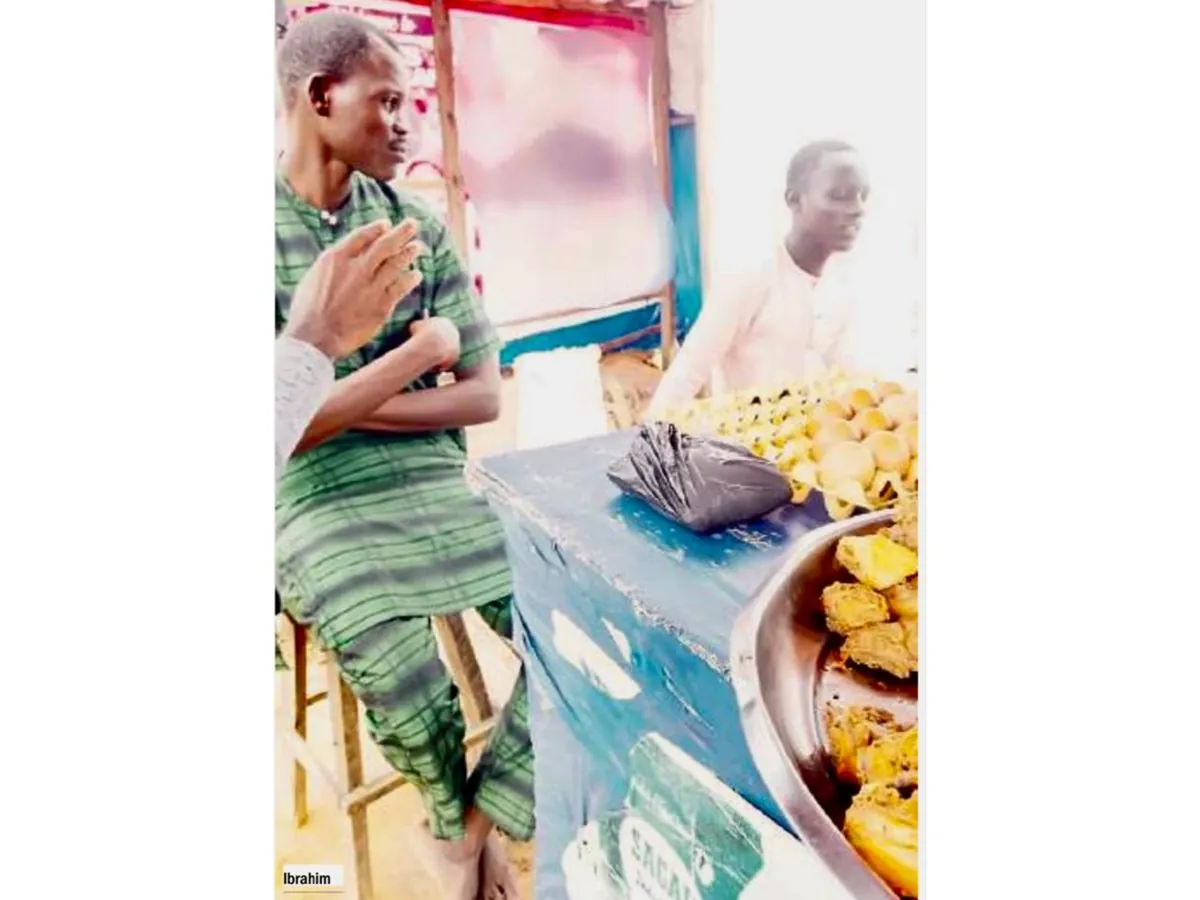He air at Mammy Market Gate in Effurun, Delta State, hung thick and heavy, saturated with the competing aromas of diesel fumes and sizzling vegetable oil. Here, amidst the relentless, dusty clamour of the busy road, stood Ibrahim, a solitary figure locked in a perpetual dance with hot grease and sharp knives. He fries yam and chicken for sale.
The man behind the smoke and the weary eyes introduced himself simply. “My name is Ibrahim Yahaya,” he shared, his voice carrying the distinct accent of Nigeria’s northern states. At forty-five, he bore the look of someone who had lived through more than just four and a half decades, his responsibilities weighing heavily upon his shoulders.
Ibrahim’s life is not just rooted in Warri, but across a vast geographical distance. His roots lay firmly in Kano State, specifically the Basari Local Government Area, where he had left behind a formidable family structure. “I have five wives and I have nine children—four girls and five boys,” he told Saturday Tribune noting that they, along with his elderly parents, remained hundreds of kilometres away in Kano.
He had come to Warri, a hub of the South-South region, two years ago with a clear mandate: “to hustle.” This arduous migration was driven by the universal pursuit of a better source of income, a desperate attempt to outrun the economic realities that had crippled his former trade in the North.
The structure of his family also spoke volumes about his worldview and his approach to life’s uncertainties. He held a pragmatic, albeit cynical, philosophy regarding his five marriages. “There is no need to marry just one wife,” he confessed, adding with a shake of his head, “If you have one wife, she can cheat on you and break your heart, so I decided to have five of them.” For Ibrahim, a large family was perhaps a form of complicated emotional hedging.
Ibrahim is positioned right at the throat of the market, his makeshift stall a beacon of deep-fried comfort against the backdrop of Nigeria’s current economic squeeze. His station was simple: a large, soot-blackened cauldron of oil bubbling furiously over a tripod stand, flanked by basins of freshly cut yam wedges and marinated chicken pieces.
The frantic energy of the scene stood in stark contrast to the quiet desperation etched onto the vendor’s face. Every drop of oil, every hiss of the frying meat, the sizzling egg and the pieces of sliced yam, represented a gamble, a hopeful investment against a daily economic uncertainty.
A young boy, Ibrahim’s apprentice, darted around him, managing small chores—arranging the display, bagging orders, and chasing away the persistent flies. Yet, even with this assistance, the lead man himself never seemed to slow his pace. His hands, stained dark by smoke and oil, worked with a practised, mechanical efficiency, slicing the tubers and plunging the chicken into the searing heat. But for all his industry, the customers were not coming fast enough.
Ibrahim’s eyes, constantly scanning the surging pedestrian traffic, held a discernible weariness, a profound look of hopeful anticipation that often turned quickly into disappointment. He was locked in the essential, soul-crushing routine of hustling, hoping for the next naira to justify the sweat and the sheer effort of staying on his feet.
This daily performance at the crossroads of Effurun was more than just a street food operation; it was a visible microcosm of a widespread national struggle, a silent battle waged against inflation and hardship. Every golden-brown piece of chicken or yam that emerged from the oil was a testimony to one man’s refusal to surrender to hunger, despite the mounting odds stacked against him.
However, the real struggle facing Ibrahim was not personal or domestic, but economic, and he was quick to pin the blame on the shifting political landscape of Nigeria. He drew a sharp and painful comparison between the current administration and its predecessor. “Nigeria was far better when Buhari was the president than now that Tinubu is the president,” he stated unequivocally, the resentment clear in his tone.
The cost of living, he lamented, has skyrocketed to levels that made basic survival a relentless fight. He recalled an era that now feels like a distant fantasy, where his margin for profit was substantial, and the price point of his food made it accessible to the masses.
“When Buhari was in power, the fried chicken that I sell for N500 now was sold for N100 and N200,” he lamented, highlighting a staggering price hike of 150–400 percent on just one item.
The staple commodity that forms the other half of his business, yam, shows an even more punishing inflationary trend. The yam tubers he purchases for frying now cost a small fortune compared to the past, stripping his business of profitability. “The yam that was N3000 to N5000 during Buhari time, is now N10,000 to N15,000,” he explained, detailing how the cost of a basic ingredient had tripled, forcing him to charge higher prices while still struggling to break even.
This relentless erosion of purchasing power meant that despite working long, exhausting hours, Ibrahim was only just managing to tread water. He and his young helper were constantly “struggling to stay in business,” driven only by the terrifying alternative of starvation.
He affirmed their desperate resolve: “We can’t stop hustling because we don’t want to go hungry that is why we are still managing things the way we see them.” It is a common mantra echoed by countless small business owners across the nation, where ‘managing’ has become synonymous with barely surviving.
The current economic environment has profoundly impacted his ability to support his family back in Kano. The money he manages to send home is a pittance compared to their needs, yet they must make do with the meagre resources available. “We are just trying to survive. We are just managing,” he sighed, summarising the grim reality of his remittances. “What I send home to them is barely enough to feed but we are managing.” It is a cycle of struggle that touches every member of his large, distant family.
The yam frying business in Warri was, in fact, his fallback plan, a desperate pivot after his initial livelihood failed to sustain him. He had initially been selling provisions in Kano, but the harsh economic climate forced him to abandon that venture entirely and migrate southwards.
He had hoped that Warri, with its oil economy and relative wealth, would offer him “a better source of income,” but he quickly had to “settle for yam frying to make ends meet,” trading one low-margin hustle for another. The move, while necessary, did not provide the respite he had hoped for.
Ultimately, Ibrahim’s narrative is a plea—a desperate appeal for intervention from the highest levels of government. His message transcends political loyalty or party affiliation; it is a primal cry for relief from economic strangulation.
“The government should do something before people start falling down on the streets due to hunger and high cost of living,” he warned, painting a vivid and tragic picture of a nation teetering on the brink of social collapse due to spiralling costs.
As the afternoon traffic roared past the market gate, Ibrahim Yahaya, the husband of five and father of nine, continued to dip his chicken into the searing oil. The weary look of hope returned to his eyes every time a new pedestrian approached. His hustle, against the backdrop of a nation he believes is in distress, remains his only weapon in the fight for his family’s survival.
Credit: Tribune Online
WARNING: If You Are Not 18+, Don’t Click The Link Below 👇🫣
https://massivemanuscriptestimated.com/kx6iepv2qm?key=6c14bd1d68e1eba721851f19778f5efe
Please don’t forget to “Allow the notification” so you will be the first to get our gist when we publish it.
Drop your comment in the section below, and don’t forget to share the post.
Never Miss A Single News Or Gist, Kindly Join Us On WhatsApp Channel:
https://whatsapp.com/channel/0029Vad8g81Eawdsio6INn3B
Telegram Channel:
https://t.me/gistsmateNG





